A
B
C
D
E
F
G
H
I
J
K
L
M
N
O
P
Q
R
S
T
U
V
W
X
Y
Z
Click a letter to see a list of medical procedures beginning with that letter.
Click 'Back to Intro' to return to the beginning of this section.
Bolus Tube Feeding
People with feeding tubes who can tolerate a normal amount of food at 1 time can be fed by bolus feeding. Feedings are most often given every 4 to 6 hours during waking hours. You’ll be told how often to give the feedings and how much water to give between feedings. To begin, wash your hands. Then open and use only the prescribed amount of liquid food (formula).
There are 2 types of syringes and feeding tubes. One type has a connection that lets you plug or push the syringe tip into the feeding tube. A newer type syringe and feeding tube has a twist on safety connector. This feature means that you must use a specific syringe that twists onto your feeding tube. Your care team will give you instructions for your type of tube. You may also be told to flush your tube with water before and after feedings to prevent clogging. Follow your care team's instructions.
Twist-type safety syringe and feeding tube
|
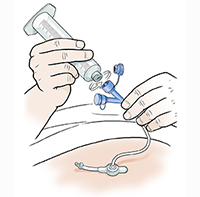
|
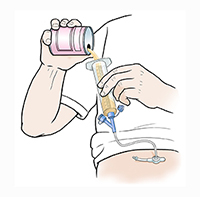
|
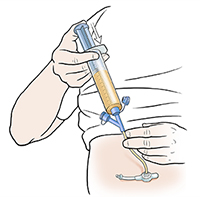
|
|
Step 1. Twist the syringe tip onto the feeding tube.
-
Pull the plunger out of the syringe.
-
Remove the feeding tube's port cap.
-
Twist the syringe tip onto the feeding tube's safety port.
|
Step 2. Fill the syringe.
|
Step 3. Give the feeding.
|
Repeat steps 2 and 3
|
You can also fill the syringe from a measuring cup.
-
Leave the plunger in the syringe.
-
Pour the formula into the measuring cup.
-
Put the syringe tip into the cup and pull up the plunger.
-
Then twist the syringe tip onto the feeding tube's safety port.
|
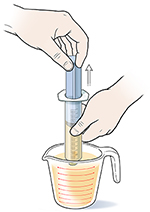
|
Plug-in type syringe and feeding tube
|
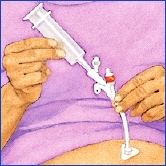
|
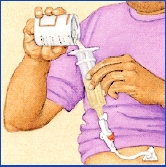
|
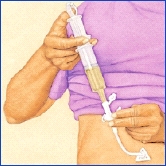
|
|
Step 1. Put the syringe tip in the port.
-
Pull the plunger out of the syringe.
-
Open the feeding port cap.
-
Put the syringe tip in the feeding port.
|
Step 2. Fill the syringe.
|
Step 3. Give the feeding.
|
Repeat steps 2 and 3
|
You can also fill the syringe from a measuring cup.
-
Leave the plunger in the syringe.
-
Pour the formula into the measuring cup.
-
Put the syringe tip into the cup and pull up the plunger.
-
Then put the tip of the syringe in the feeding port.
|

|
Online Medical Reviewer:
Jen Lehrer MD
Online Medical Reviewer:
Raymond Kent Turley BSN MSN RN
Online Medical Reviewer:
Ronald Karlin MD
Date Last Reviewed:
2/1/2022
© 2000-2025 The StayWell Company, LLC. All rights reserved. This information is not intended as a substitute for professional medical care. Always follow your healthcare professional's instructions.